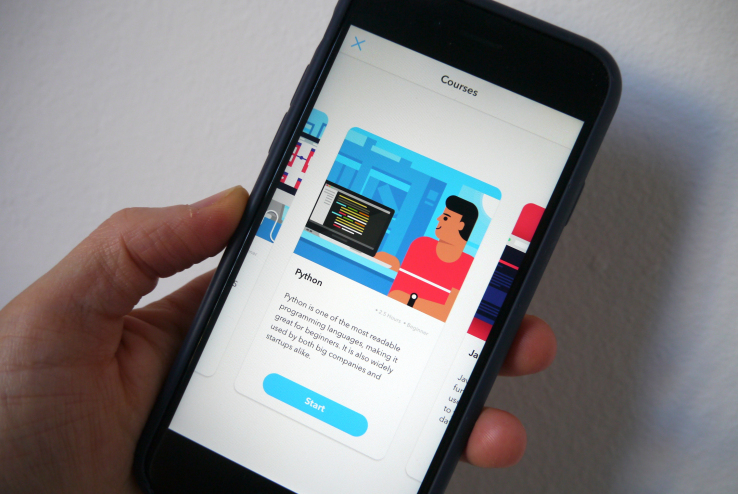
Teaching people to code in bite-sized, gamified chunks delivered via mobile app is Py‘s mission. The fledgling startup is the brainchild of two friends and college computer science majors who found themselves repeatedly asked for advice on how to learn to code.
“Lots of people asked us how should we learn to program or what resources should we use,” explains co-founder Derek Lo. “We would give people different resources and we would find out they wouldn’t really complete anything. And they would find it too hard or not fun. Or they couldn’t find the time. So that’s how this idea came about — we sort of thought why don’t we create something for the phone where somebody can learn these kind of hard things anywhere and then make it also very fun.”
Py got an unexpected download boost recently after Apple featured it in its App Store — and has now racked up over 100,000 downloads. This is without concerted marketing efforts (they did launch on Product Hunt last September, so early users have skewed towards Silicon Valley/California). It’s also without an Android app — which they’ve just now released this week.
The Py duo are also now part of Y Combinator’s summer 2017 batch of startups, delaying entry into the program while Lo finished his college degree.
They started working on the iOS app in May 2016, launching a beta soon after. At the time they were thinking about all sorts of learning — pitching TC with the idea that Py would cover a broad a variety of subjects, including humanities, sciences and even courses like English grammar, not just programming topics like Python.
To my eye this seemed overly ambitious. And they have now circled back to the original focus: programming. And — even more practically — to arming budding developers with the skills they need to build specific things, such as a website or an app. The idea, says Lo, is to offer customized, modular, practical learning for developers — hence the app also has a course offering coding interview tips.
“We’ve been very focused on programming for a while but programming applied to, say, iOS development or making a website or data science,” says Lo. “So we’ve got a lot of courses on core programming — so how do I learn the basics of Swift or learn the basis of Python — but we’re just now releasing courses that are much more project-based. So how would I actually take these skills in Swift and then go and write an iPhone app? We’re very excited to be launching those kind of courses that will give people a real understanding of how this actually gets applied.”
The Py app offers around 10 free “courses” at this point — including the likes of Javascript, Swift, Python and HTML/CSS. The founders are largely creating the course content themselves, partnering with external professors, engineers and research scientists to “ensure high quality”, as they put it.
It’s fair to say that the learn-to-code space is a pretty packed one these days, with all sorts of creative approaches to inspire learners of all ages — from board games to programmable robots to gamified learning platforms (and/or games with learn to code elements). So where does Py fit into such a competitive learning landscape?
It’s best described as fitting into the mould of (non-computer) language learning apps — of which there’s also a rich variety these days (Duolingo, Babbel, Verbling etc) — offering budding developers similarly engaging touchscreen-based interactions as a route for learning.
“There are a few very concrete ways that we differentiate ourselves,” Lo tells TechCrunch. “One is these kind of interaction types that we’re built… we have four, maybe five. So essentially users can answer multiple choice questions — they can answer…

